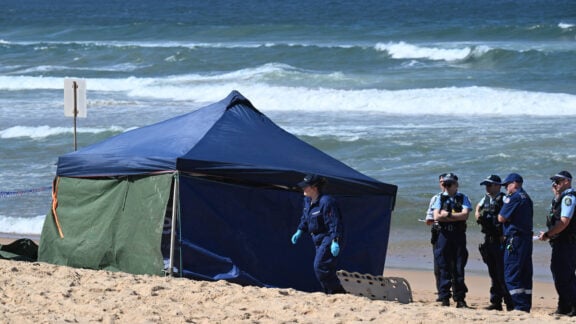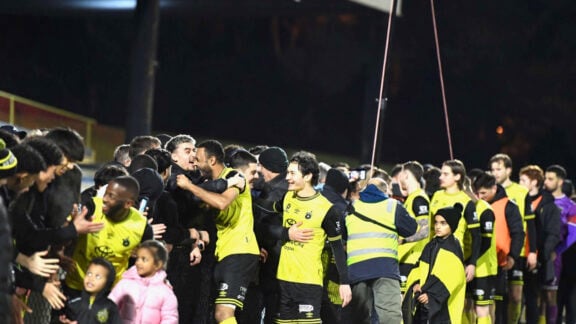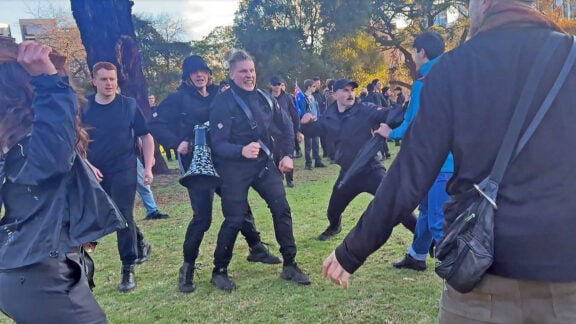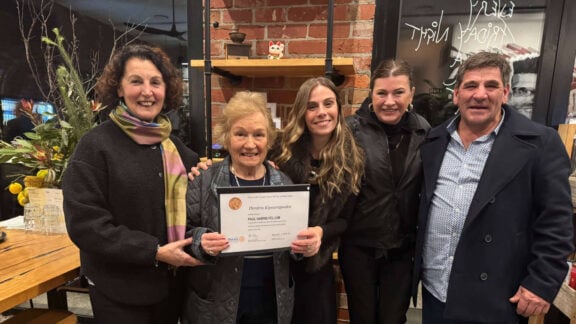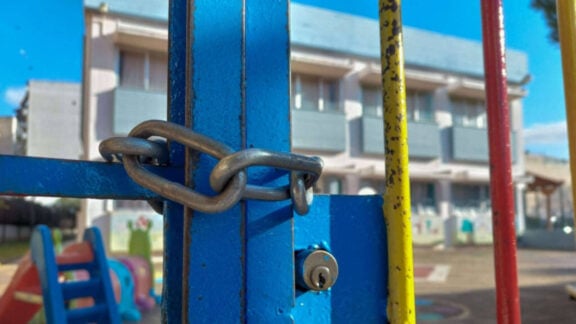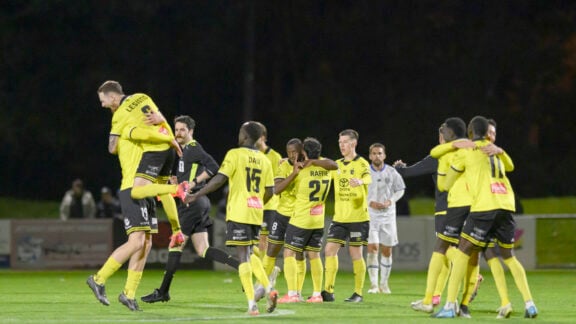Nikos Mingos’ (Tsilimingos) home in Bentleigh East, Melbourne, overflowed with love as his relatives recently gathered to celebrate yet another significant milestone in his life, his 100th birthday.
Warm hugs, broad smiles, heartfelt conversations and many phone calls from every corner of Australia with well-wishes.
Truly beautiful moments, filled with joy, as Mr Nikos deeply enjoyed them, touched to the soul.
The same youthful spirit, as decades ago on the island of Lemnos, where he reveled in the village of Kontia as a young man, romantic, adventurous, but also a successful professional later on. Well-known throughout his local community and even in Athens, where he had established businesses.
A carefree soul, forever marked by his experience in the Civil War, where he fought – often on the front lines – from 1947 to 1949. He narrowly escaped death – the bullet hit the billy can (“καραβάνα”) instead of his body – and, according to him, a little cross he always worn, also protected him, as he narrates, and it seems “it performed its miracle”.

After those ‘dark’ years of the Civil War, Mr Nikos, although he had built a good life in Lemnos, decided to migrate to Australia “for the sake of an electric vacuum cleaner”.
He never stopped working hard, even after retirement. He chased his luck, and it smiled at him – as it often does to the daring – not only once but multiple times.
He had already won although the biggest “lottery” a long time ago. The heart of his most precious “ally” in life, his wife for 70 years and more, Asimenia (Asimina, nee Voulgaraki), who, unfortunately, was not by his side to celebrate his 100 years as she passed away in May 2023 at the age of 98.
However, his children, Giannis and Kostas, his grandchildren (Nikos, Asimoula – Jasmin – and Nikos, Alexia), and many-many relatives there with him.
Among them were his beloved siblings, who share the strong DNA of their father, Giannis, an Asia Minor refugee from Reis Dere, who passed away at the age of 106 (according to official documents, even older – 108 – according to his children’s memories).
Besides the elder brother, Nikos, who turned 100 (born on January 16, 1924), the second in line, Vasilis, celebrated his 97th birthday recently too (born on January 13, 1927).
The third, Panagiotis, is 93 (born in 1931), and the “Benjamin,” Christos, who gracefully strides into his 82nd year (born in 1942).
Only Dimitris (or Dimitros), born in 1938, was absent as he resides in Greece, where he has been living with his wife since the late ’70s when they returned from Australia.
They may hold an unofficial record – either in the Greek diaspora or pan-Australian – for the five siblings with the most lifespan combined.
Certainly, the wish “to reach a hundred” is not appropriate for them.
“You can wish us to be well. Health, the most precious asset!” they told Neos Kosmos.
The time came for Mr Nikos to blow out the cake with the “100” candles.
“Look, a whole ‘100.’ Who would believe it…” he happily exclaimed, surrounded by members of his family (including some neighbours who have known him for decades, since the mid-’70s when he moved to Bentleigh East).
“I want to thank my children, Kostas and Giannis, my grandchildren, who have kept me going until now at my 100 years! (his voice breaks from emotion). All my siblings and relatives. May they all be well, and I thank them from the bottom of my heart! Thank you very much.”

100 YEARS OF LIFE
It was the second time, within a few days, that Mr Nikos warmly opened his home to us. It was last week -with the goal of extracting the secret of his longevity- we had asked to meet him, and he did not refuse.
Truth be told, we had a good “mediator,” his fondness for his younger brother Christos (Chris Mingos), who in 2015 had spoken to Neos Kosmos about the foundational pillars of their family, their parents, Giannis and Georgia (also known as Giorgitsa, a Mikrasiatissa).
Nikos Mingos welcomed us into the living room with a warm handshake. Instead of us starting the interview questions, he had one for us. Like a character test, you might say: “Which village are you from?”
Our response (no need for details on how long we spoke about it, as all fellow countrymen know what happens when you meet someone from your hometown on the other side of the Earth) pleased him. He seemed to be transported to places and familiar faces.
He smiled and rose from his comfortable armchair, inviting us to move to the kitchen table.
His son, Kostas, was with us, joined by Mr Christos, the “encyclopedia” of the family.
There, we were “surrounded by congratulatory letters for reaching his 100 years (from King Charles and Queen Camilla, the Governor of Australia, the Prime Minister of Australia, the Prime Minister of Victoria, the Minister of Internal Affairs), congratulatory cards from relatives and friends with the imposing “100” upfront, black-and-white photos from another era, as well as more recent ones with children and grandchildren.
Then, Mr Nikos drew us into a tsunami of memories.
CHILD OF REFUGEES FROM ASIA MINOR
Nikos Mingos was born just two years after the Asia Minor Catastrophe. His parents, after numerous and gloomy adventures, found refuge in the village of Kontias on the island of Lemnos. They had already lost a child (the late Giorgitsa, who, to escape from the hands of the Turks ‘when the trouble broke out,’ fell into a well with their one-year-old son in her arms. She managed to survive, but the child did not, as Mr Christos had narrated).
In Lemnos, in 1924, the memories of the ANZAC (Australian and New Zealand Army Corps) were still fresh, and Mr Nikos, growing up, remembers stories about the thousands of soldiers from the other end of the Earth. Little did he know that about 35 years later, their land would become his second homeland.
As for his first, special homeland?
“Ah, Lemnos, the most beautiful island in the Aegean,” he would say.
“Should I write the most beautiful island of Greece?” we commented, making him smile. We understood that he wasn’t making any “comparison” in his mind, but it was a deep, everlasting nostalgia. The kind that torments every immigrant for the place they grew up, the faces, the scents… the life they left behind. For every expat, their own homeland is the most beautiful, and obviously, comparisons just don’t work.

WORK FROM CHILDHOOD
“Just when I turned 12, my father took me to Myrina (the island’s capital). In a store called Dardanopoulos, a grocery store. I worked there for about a year.”
“I wanted to become a blacksmith. In Roussos, in the village, I worked for three days. My mother didn’t let me go back because she didn’t like that I got dirty with charcoal and all the tools there.”
“Then, I became a tailor. I learned the craft in the village, from a friend named Vangelis. The last name? Leontidis! Look I still remember it.”
The difficulties were many, but there was always a spirit of fun:
“I had a friend, Giorgos (Giannakis in the surname, or better known as ‘Giorgaros’ to the locals), we used to stroll around the narrow streets of the village. He was a year older than me (he passed away last year). In the evenings, we would go out in the village singing, and… we drank a little.”
Despite the difficulties, those were carefree years filled with love and solidarity.
Nikos was 16 years old when the Greco-Italian War started in 1940. The German occupation followed on the island in 1941. Years of hardship.
“I learned German flawlessly, and I wonder how I don’t remember a word now.”
“I was with ‘μπάρμπα’ (uncle) Stavros Kaliomiras, who was a cook, and I was his assistant. The Germans were inside the school (of Kontias) then, and he had a kitchen next door. People from other villages would come to get food (‘συσσίτιο’ – soup kitchen during wartime).”
“I remember as soon as the Germans left (from Lemnos in ’44), I had this friend I told you about (Giorgaros), he was a fisherman… We went to Agios Antonios (to a nearby village by boat). The Germans had left iron bars, and the gypsies would come and buy them (like scrap metal). We filled the boat, and we sold them for 2,500 drachmas.” A significant amount for the time.
“We ‘spent’ it in one night,” says Mr Nikos, smiling.
“We danced, drank, and most of the money went to the instruments. We threw money away, for nothing, I’m ashamed to say it.”
THE CIVIL WAR
Mr Nikos was called to the Army during the Civil War. He served from 1947 “until around ’49,” he recalls.
“They sent me to train in Crete… They had me as a sailor at first, but at the last moment, a police officer (‘ενωμοτάρχης’) changed it… He had a girlfriend, but I ‘stole’ her. For revenge, the officer took me out of the Navy and sent me to the Infantry. After training, they sent me to Xanthi, to Echinos.”
“To tell you what I went through (during the Civil War) would take whole days… there are so many things that sometimes drive me crazy when I remember them.”
“In Xanthi, they assigned me to Battalion 556. It was a Reserve unit. Wherever the rebels attacked, we went. In Veria, Naousa, Belles…”
“We were in Lagada. Across from us was (mount) Belles and the Metaxas forts. We had information that Captain Mavros and his rebels were going to move. We were on one side, gendarmes (‘χωροφύλακες’) on the other. We waited for them to pass between us. But he also had his own information. He went another way, and they climbed up to Belles.”
“It was night. We had an order that when we smoke, we should put the cigarette in the barrel so the fire wouldn’t show. But one of our guys lit a cigarette (without hiding it). The gendarmes noticed it (thinking they were passing rebels), and the shootings started. Many were killed (neither side knew they were shooting at each other).”
“We took them for rebels. Darkness. As they ran, their hats fell off. We saw hats with the insignia of the Gendarmerie. ‘Well, what’s happening here,’ someone shouted. They fired flares (we realised we were on the same side), and we joined forces.”
“We camped in Lagada… When the rebels were leaving for Belles, most of them had frostbite. It was winter of ’48. Our Lieutenant says you will search for those who stayed behind. A Detachment went out… I went and caught a stream, but there was no water… I was a machine gunner, carrying the weapon, 12-15 kg on my back for 2.5 years.”
“I had moved away from the camp about a kilometer. There was a fig tree. There was a rebel there…”, Mr Nikos remembers, and his voice “breaks,” indicating that the memory is not pleasant.

“As soon as I got close, he raises his hands and says, ‘comrade’ (σύντροφε). ‘Comrades’ were the communists, ‘fellow competitors’ (συναγωνιστές) were the soldiers. He was a 42-year-old man. He told me he had a son who was a soldier. The rebels, excuse me for the phrase, called us ‘Frederick’s bastards.’ He came closer. The first thing he asked me: ‘Cigarette.’ I opened the pack, and he took two. He put both in his mouth. He wore tsarouchia (‘τσαρούχια’), and one half was wrapped in cloth; that’s why he couldn’t walk (there was snow). We left together.”
“On the way, he called me ‘comrade.’ I said, ‘friend, don’t you dare say comrade again, because where we’re going, and I hand you over, you don’t know what will happen to you.’ We arrived at the camp… We had a Sub-lieutenant… he was a brute… they had brought others (rebels)… The Sub-lieutenant went near (the one I handed over), and he says, ‘Who are you?’ ‘Comrade, I am…’ He didn’t get to say a second word…”
“I went through a lot in the Army… I had an aunt in Lemnos, Kyriakitsa (my mother’s sister), and she knitted me a pullover (φανέλα) to send for the cold. At that time, monks used to visit the villages and gave little crosses to women. This aunt of mine, a monk gave her one and said, ‘Take care of this; it’s from the Holy Wood of Christ.”
“They used to say these things; I didn’t believe them. But if you honour this little cross, you might think in your mind that it’s from the Holy Wood. And that’s how it happened, I think.”
“She sent me the pullover; it was green, and she put the little cross under the armpit with a safety pin… I wore it. We received orders to go up to Belles, to recapture the forts from the rebels. Initially, we couldn’t. The unit retreated into the field.”
“As we were retreating, bullets were ‘whistling’ (around us). We were scared, but we were also far away. Perhaps they didn’t have enough strength to kill us…”
“When we left there… we went to another mountain. The Lieutenant told us to rest… We had our backpacks as we passed for 4-5 days with dry food and a billycan (army food tin can). Whenever we stopped somewhere, we ate in it.”
“I took out a can, but I also wanted bread. I took out the billycan, which also had bread, and there was a bullet inside. I tremble as I say it. The bullet found the billycan and the bread… I never took that little cross off me… I honoured it.”

From the Civil War, just before being discharged, he remembers Queen Frederica, who personally awarded him a medal on the chest for the recapture of Naousa, which proved difficult at the beginning.
“We made a move, but we couldn’t (advance much). Naousa is at the foothills (of a mountain), and behind, it’s all fields… The Army retreated… but I and the other two didn’t make it in time.”
“We fell into a stream with running water, to escape the bullets ‘whistling’ from above. We were in the water. From morning until night. Fortunately, it wasn’t raining. When it got dark, we were able to leave. Because if we raised our heads (during the day): ‘bam, bam, bam…'”
“We went back. We made a move again to take Naousa. But before we went… the rebels had gathered all the children… I experienced what they call ‘child gathering,’ (παιζομάζωμα)… They went up to Vermio and left. And then we entered.”
“And when 10-15-20 days passed, I don’t exactly remember, the queen came with her guard and awarded us medals. She came herself and put a Cross (medal) on my chest. I brought the Cross here, but with the moves I had in the Milk Bar, I lost it. But I have it in a photograph.”
RETURN TO LEMNOS
He was discharged from the Greek Army in 1949 and returned to Lemnos, wanting to leave behind the horrors of the Civil War. There, his parents and four siblings were waiting for him. The family, apart from the first child they lost in 1922 (whose name was Nikos took), mourned a 40-day-old Fotini in 1933 and Margarita, who died at the age of 7 (born in 1935).
“This up here worked,” he says, pointing to his head, recalling his return to his hometown.
“I became an order taker (‘παραγγελιοδόχος’). Athens – Lemnos, Lemnos – Athens. Every week. One week in Athens, one week in Lemnos.”
“The ships in Lemnos – he mentioned – were not like the harbor is now. All goods (and passengers) came out (and returned to the harbor) with small boats.”
“At that time, the island had 36 villages. I used to go around all of them with my bicycle. There were no cars on Lemnos; there were only three taxis then. I went to the villages, took orders in the shops, and went (by ship) to Piraeus and Athens. I bought things for the shops and brought them to Lemnos.”
“When I returned to Myrina, I took a truck and distributed them. I was paid by a percentage on the invoice. I was paid 5 per cent, 10 per cent. Especially if it was medicine, I got more.”
“The whole town knew me and loved me. Back then, I wasn’t called Mingos; I was called Tsilimngos. The whole of Lemnos knew me. I was the most famous – I’m ashamed to say it.”
“I made money… I made a lot of money. But I didn’t have a ‘good head.’ My son is in front of me now, listening…”
“Did you continue the way you did when you were young, enjoying and having a good time?” we asked.
“Yes, yes. To get a shipment (from Athens), I had to go to a factory, to a warehouse. They (the responsible persons of businesses in the capital) would schedule appointments for lunch. During the day, I was in the glamorous salons of Athens, and at night, I was in the dark ones. In the basements with the bouzoukia, the rebetika.”
“Ah, the good old days,” Mr Nikos exclaimed, raising his hands high, clenched fists, like a victor, not just of a battle but of life itself.
“I was a rebetis. I danced a heavy zeibekiko in Tzitzifies. It was Papaiioannou. He sang to me ‘Στα Τρίκαλα στα δύο στενά’…” (referring to Giannis Papaioannou, koubaro and close associate of Vasilis Tsitsanis, who first appeared professionally in singing alongside Markos Vamvakaris and Stelios Keromytis in 1937).
However, the moment came when he got married, “in 1951 or 1952,” he continues.

“Asimenia and I loved each other since we were kids. We were neighbors. One day, we sat by Jaros’ well, as they call it. It had a cottonwood tree…”
“This well had the best water in the world. We were there, Asimenia with her friends, and me. All the same age. Asimenia held a carnation. ‘Won’t you give it to me?’ I asked her. Generously, she gave it to me. I took it. I put it in an envelope – imagine now, we were 7 or 8 years old – and gave it to our mother, and she placed it on the icons.”
“We got married, and I still had that carnation. I told her, ‘Asimenia, I want to give you a gift.’ I showed it to her, and she said, ‘I don’t remember.’ Well, she was still young. She tries to open the envelope, but the flower had turned into dust.”
The flower withered, but their love blossomed, bringing them to Australia. Their marriage lasted for 70 years and more. Unfortunately, Asimenia passed away in May last year.
“When I pass by, I greet you with a tie and collar until it’s time to take you…” (Όταν περνώ σε χαιρετώ με γραβάτα και κολάρο μέχρι να έρθει η ώρα να σε πάρω), I used to sing to her before we got married every time I passed by her house… Ah, Asimenia, it’s been 7-8 months since she died, but she never leaves my mind,” Mr Nikos recounts, moved, with tears in his eyes.
Their first son, Giannis, was born in Lemnos in 1955, and the second, Kostas, in Melbourne in 1962. They each “gifted” two grandchildren: Giannis and Asimoula (Jasmin) for Giannis, and Nikos and Alexia for Kostas.

THE TAVERN IN LEMNOS
“After the wedding (and before coming to Australia), I continued and worked as an order taker (in Lemnos). There was no entertainment; only work. I didn’t even smoke one cigarette so I could save money.”
“And I opened a tavern in the village. I had up to 400 seats. People (customers) came from all over Lemnos. They knew the ‘Patatia.’ They didn’t have cars. They rented trucks, motorcycles (to come).”
“Once again, you were mingling with people,” we commented.
“Well, runs in the DNA,” Mr Nikos replied.
“I initially opened it for fun. I started with two tables. People had a good time, and it grew and grew… I had a cousin, and I gave him money to start the dance (ignite the celebration). I also had musical instruments.”

IN AUSTRALIA DUE TO THE… ELECTRIC BROOM
The first from the Tsilimingos family to arrive in Australia was the second brother, Vasilis, in 1954, following an invitation from their fellow villager Sotiris Kalomiris. Dimitrios followed in 1956.
“I came in 1959 with the ‘Flaminia,’ an Italian (ship), from Piraeus, with Asimena and little Giannis.”
“How did you make the decision?” we asked.
“You see, many were leaving the village before me. They were making a lot of money (in Australia).”
“There were kids who were shepherds, living in the mountains, didn’t know what shoes were. They wore tservoulia (‘τσερβούλια’). And they would send letters to their mothers, writing: ‘Mom, I’m having a great time here in Australia. My wife sweeps with an electric broom.’ Imagine that! There, we had simple brooms, sweeping with the bristles. And you hear that in Australia, they sweep with an electric broom.”
“My other relatives had also left. So, I made the decision (to go) too.”
From Lemnos by ship to Piraeus and from there departure with the ‘Flaminia’ to Australia. After almost a month, arrival in Freemantle, and shortly after, in Melbourne, at Port Melbourne.

“WHERE AM I GOING?”
Mr Nikos reflects on his journey since coming to a new country, remembering the challenges he faced at the beginning.
“As we got into a car, I was looking at the houses with metal roofs outside. ‘Where am I going?’ I thought to myself.”
Recalls being taken “straight to General Motors for work”, by his brother, Vasillis.
“I knew German, but not a word of English.”
On his first day there, an Italian foreman approached him, handing over a pistol for welding.
As Mr Nikos initiated his welding task, sparks erupted in every direction.
“My heart was pounding. I thought to myself, ‘where have you come, Niko? Leaving your little tavern (in Lemnos) and coming here.'”
He worked 3 days and one hour overtime.
“I didn’t even ask for the money. They still owe it to me.”
After that, a friend of his brother Vasilis, Andreas, found him, and took him to work at a factory that made fabrics, where he worked for eight years.
“I liked it there because it was clean work.”
His wife Asimenia, who was a hairdresser (in Lemnos), brought her tools along with her, but the techniques here (in Australia) were different.
“She ended up going however, to another factory where she worked as a seamstress.”
THE ENTREPRENEURIAL SPIRIT
Initially, they stayed with his brother Vasilis in his house in South Yarra.
After some years, with Asimenia’s sister, Aimilia, who was also in Melbourne, and her husband, they jointly bought a house on Garden Street (South Yarra).
They later sold it. “We got 2,500 pounds each in hand. I gave the 500 we owed (to Aimilia and her husband), and with the remaining 2,000, I bought another one (house) on St Kilda (on Kipling Street),” says Mr Nikos.
“I stayed in that house for 1.5-2 years, sold it, made some money, and came here to North Road and bought a Milk Bar. That brought me more and more…”
Mr Nikos bought a shop, increased business, sold it, made a profit, and then bought another.
“I can’t even remember how many shops I changed…”
Each Milk Bar came with a house. Kostas and Giannis were among the Greek-Australian kids who grew up in Milk Bars.
“The first 5-6 years, I changed three schools. From school to the shop,” mentioned Mr Kostas.

Demanding work. Many hours, every day, at the Milk Bar.
“Being here for 65 years, did Australia ‘treat you well’?” we asked him.
“At first, it was tough… then, I was okay.”
“Let’s say you won the lottery,” his younger brother Christos teased him several times during the interview.
“No,” he said.
However, he later graciously shared how, from time to time, he pursued his luck, which smiled at him more than once. So, besides the money earned through hard work, he had additional financial comfort to offer to his family, from children’s education to more regular trips – mainly to Lemnos – always with Asimenia by his side.
They renovated his paternal house in Kontia, which Mr Nikos proudly displays in a photo high in the living room of his house in Bentleigh East.
“I had a wife who was really smart and capable (‘έπιανε πουλιά στον αέρα’)…,” he says, remembering her with melancholy. “I loved her very much!” he emphasised.
“Did you read the Neos Kosmos newspaper?” we asked, attempting to change the topic a bit.
“From the first day I came. I didn’t leave a single letter unread…,” he replied.
“When did you finally get the first vacuum cleaner in Australia?” we continued.
His son smiled.
“When we moved from Garden Street to Kipling…,” Mr Nikos answered.

LIFE
Life in Australia was getting better and better. Besides work, he found the entertainment he loved so much at gatherings with relatives and friends.
The whole family was now in Melbourne. Mr Christos arrived in March 1960, followed by Panagiotis six months later. In 1961, their parents, Yiannis and Giorgitsa, also joined them.
Dances, weddings, baptisms.
“I gained many friends, and every week we had visitors,” says Mr Nikos, who became synonymous with the entertainment of fellow Greek Australians.
For some years in the early ’80s, he managed Lemnos Reception in Middle Park, where dozens of Lemnians and many other Greek Australians shared their joys with thousands of people.
After retiring, he continued to work, this time alongside his son Kostas in the store they opened together in Brighton on Church Street.
Besides his businesses, Mr Nikos had a passion for his garden, always well-tended.

Now, he needs assistance to take care of it.
“Thanks to ‘Fronditha,’ they are doing well,” says his son Kostas.
“I am very satisfied with the services they offer. They take care of all my father’s needs every day. Everything he needs at home, cleaning, the garden.”
Mr Nikos agrees, emphasising that gratitude to ‘Fronditha’ should be highlighted.
Even today, his best company remains his brothers.
“Say something nice about me too,” jokes Mr Christos. The truth is that “the little one comes by every now and then,” Mr Nikos continued.
Also, with 97-year-old Vasilis and 93-year-old Panagiotis, they “share their solitude.”
Every Sunday, they go together to the graves to “visit” their wives (Mr Nikos’ Asimenia, Mr Vasilis’ Dimitra, and Mr Panagiotis’ Maria) who passed away.
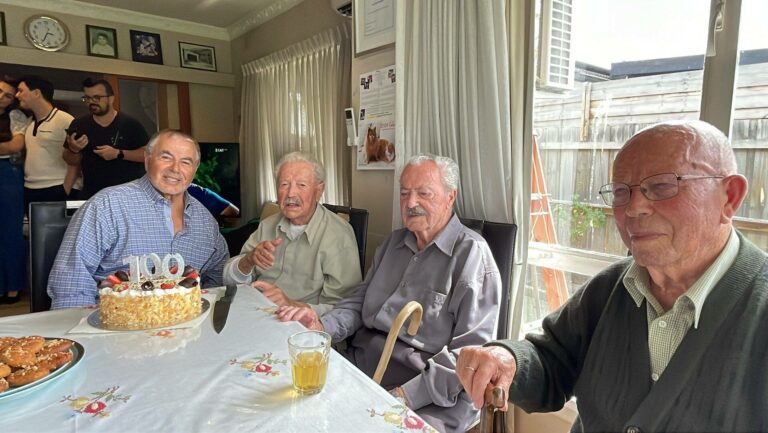
Afterwards, they return home (one Sunday to one, the next to another, and so on), have their coffee, talk, reminisce.
“What do you take from your life after 100 years? When you wake up in the morning, what is the first thing that comes to your mind?” we asked.
“I almost always see Lemnos and my Asimenia…,” Mr Nikos replied. His two great loves.
From the mid-’80s onwards, they traveled to Lemnos every other summer with Asimenia.
It was in 2010, he recalls, that they visited the island for the last time with his beloved wife.
“Do you miss them?” we asked.
“A lot!” he responded.
“Do you regret anything in your life?”
“I am very satisfied!”

Perhaps not coincidentally on the day of our first meeting he chose to wear a white shirt with bold black letters, accentuated by lines of blue colour.
“Association Lemnian Youth,” we read.
The same one he regularly wears, from what we learned, as it reminds him of the “foundation” of his life, his island, and the course of his life in general.
The truth is that with all we discussed with Mr Nikos, we neglected to ask him the secret of his longevity.
However, the hours we spent with him helped us understand at least some of the secrets of his well-being.
It is often said that old age “doesn’t come alone,” because, at least biologically, youth is a one-time deal. Physical fatigue diminishes, and health is not as it used to be.
But ultimately, if you have a life “full” of love, joy, good company, a youthful soul, and, let’s say, a bit of luck, don’t fear old age.


